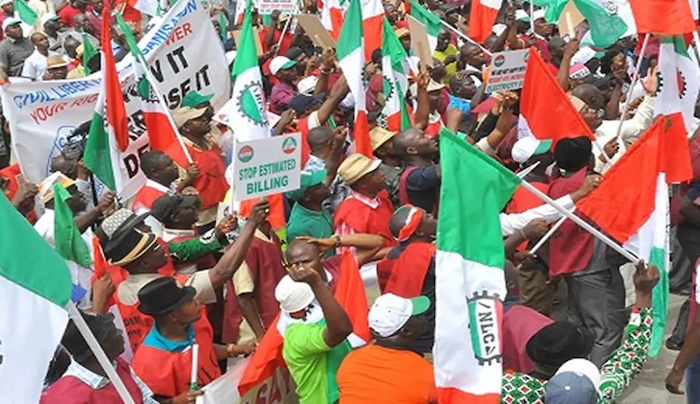On Tuesday, the Nigeria Labour Congress (NLC) provided the reasons why it had reached an agreement with the federal government to temporarily halt the strike that was planned to begin today. The NLC stated that it had taken into consideration a restraining court injunction that had been obtained by the government in an effort to halt the planned statewide strike.
The employees’ union claimed that the federal government was using ex-parte injunctions as a means to muzzle the workforce.
KPMG, an international audit, tax, and advisory services business, on Tuesday warned that the current withdrawal of petrol subsidy in Nigeria may see the country’s inflation rate increase to 30 percent from June onward. NLC’s explanation came after KPMG’s prediction. NLC’s explanation came after KPMG’s prediction. It suggested that precautions should be taken in order to lessen the negative impact of the new regulation.
In a same vein, the Nigerian Economic Summit Group (NESG) yesterday recommended the federal government that it should overcome resistance to its meritorious removal of petrol subsidy by effectively communicating the benefits of the removal and mitigation plans that are in place to cushion the detrimental effect of the removal.
The National Labour Committee (NLC) and the Trade Union Congress (TUC) cancelled the strike action that was intended to begin today and continue for an unlimited amount of time across the country in order to protest the withdrawal of fuel subsidy by the federal government last week. The strike action was due to begin today. At the conclusion of a negotiation conference between the federal government, TUC, and NLC, a seven-point agreement was achieved, one of which was to call off the industrial action that had been scheduled.
On Monday, Justice Anuwe put an end to the planned strike that would have affected the entire nation. An application had been submitted by the federal government, and the ruling that the court issued was in response to that application. The application focused on the severe effects that the strike would have on all facets of the economy.
On May 29, President Bola Tinubu gave his inauguration address. One of the highlights of the speech was the removal of the petrol subsidy. The Nigerian National Petroleum Company (NNPC) Limited raised the price of petrol shortly after it was announced that the government would no longer subsidise the cost of fuel.
The increase in prices prompted immediate responses from both the NLC and the TUC. In their statements, both organisations accused the government of not conducting the appropriate discussions prior to eliminating the fuel subsidy.
The National Labour Congress (NLC) stated that it had taken into account the restraining court injunction in a communiqué that was published after an emergency meeting of the congress’s National Executive Committee (NEC), which had been called to review the conclusion of a dialogue with the federal government on the increase in the cost of petroleum products.
In a communiqué that was signed by Joe Ajaero, President of the NLC, and Emma Ugboaja, General Secretary of the NLC, it was stated that the NLC has postponed the strike in order to show to the federal government the necessity of complying with the laws of the land.
It also claimed that it took into account the desire of the government to debate on the concerns, the general attitude of the nation after the most recent elections, and the necessity of pursuing national stability as factors in its decision.
The National Labour Committee (NLC) provided the following explanation in the communiqué: “Taking into consideration the fact that the federal administration has obtained a court injunction blocking Congress from proceeding with the scheduled nationwide strike, as the NEC-in-session had ordered to commence on Wednesday, the 7th of June, 2023;
“Recognising the willingness of the government for continuous engagement through dialogue and to offer reasonable palliatives in due course to cushion the effect of its policies and some levels of understanding that have been reached.”
“Taking into consideration the state of the socio-political climate in the wake of the most recent elections as well as the imperative to work towards maintaining national stability, the NEC-in-session resolved as follows:
“to commend and applaud the diligence of the Congress’ leadership in carrying out the assignment given to it by the NEC. ”
“To demonstrate to the federal government the necessity of complying with the laws of the land, particularly as it relates to obedience to the rulings of the courts and their flagrant disregard to the 2023 Appropriation Act. ”
“To, therefore, support and accept the decision of the leadership of Congress to suspend the proposed strike action in compliance with the flawed rulings of the NIC and also to allow negotiations to flow freely and enable final agreement during or after the 19th June, 2023 negotiation round with the federal government,” the resolution reads. “To, therefore, allow negotiations to flow freely and enable final agreement during or after the 19th June, 2023 negotiation round with the federal government.”
The Nigerian Labour Congress (NLC), on the other hand, did not agree with the decision that was made by the National Industrial Court (NIC), which it referred to as the “continual weaponization of the instrument of ex-parte injunction in favour of the government against the interest of Nigerian workers.” It was stated that the decision taken by the industrial court was in contravention of the position taken by the Supreme Court regarding the utilisation of ex-parte injunctions.
“All Affiliates and State Councils of Congress are hereby directed to suspend further action and mobilisation until the outcome of the final negotiations,” the NLC declared.
It advised its branches and associate unions to remain vigilant and be on standby in case it was necessary to continue the strike, and it emphasised the need of being prepared.
Onyebuchi Ezigbo, Emmanuel Addeh in Abuja and Dike Onwuamaeze in Lagos
